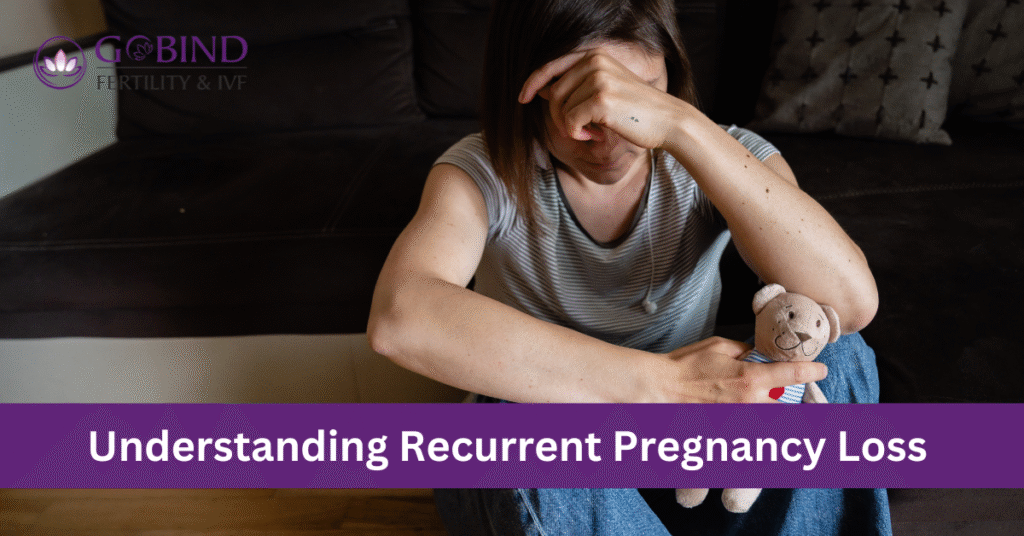Understanding Recurrent Pregnancy Loss: Causes, Diagnosis & Support

Recurrent Pregnancy Loss (RPL)—commonly referred to as multiple miscarriages—can be one of the most emotionally and physically distressing experiences for hopeful parents. Defined as the loss of two or more consecutive pregnancies, RPL affects approximately 1–2% of couples trying to conceive. Understanding its causes, diagnostic protocols, and the types of support available can help couples take informed steps toward a successful pregnancy.
This comprehensive guide covers everything you need to know about recurrent miscarriage: causes, medical evaluation, treatment options, emotional support, and key insights for couples navigating this difficult journey.
What Is Recurrent Pregnancy Loss?
Recurrent pregnancy loss (RPL) is medically defined as two or more pregnancy losses before 20 weeks of gestation. These losses may happen consecutively or intermittently. Unlike occasional miscarriages, which are relatively common and often unpreventable, RPL warrants deeper investigation to uncover underlying medical, anatomical, or genetic factors.
Common Causes of Recurrent Pregnancy Loss
Understanding the causes behind RPL is the first step toward managing and overcoming it. Here are the primary factors known to contribute to recurrent miscarriages:
1. Genetic or Chromosomal Abnormalities
- Nearly 50–60% of early miscarriages are due to chromosomal anomalies.
- These include balanced translocations, where one partner may carry rearranged but balanced chromosomes that can lead to unbalanced embryos.
2. Uterine Abnormalities
- Uterine anomalies such as a septate uterus, fibroids, or intrauterine adhesions can interfere with implantation and growth.
- Congenital abnormalities or scar tissue (Asherman’s Syndrome) can also reduce the uterus’s ability to support pregnancy.
3. Hormonal Imbalances
- Conditions like Polycystic Ovary Syndrome (PCOS), thyroid disorders, uncontrolled diabetes, or luteal phase defect can lead to early pregnancy failure.
4. Thrombophilia (Blood Clotting Disorders)
- Antiphospholipid syndrome (APS) is one of the most commonly diagnosed autoimmune disorders associated with RPL.
- Inherited thrombophilias like the Factor V Leiden mutation can cause poor placental blood flow, resulting in miscarriage.
5. Infections
- Though less common, infections such as Listeria, Toxoplasma, Rubella, Cytomegalovirus, and Herpes (TORCH) can cause pregnancy loss.
- Chronic endometritis (inflammation of the uterine lining) has also been linked to RPL.
6. Environmental and Lifestyle Factors
- Smoking, alcohol, obesity, excessive caffeine intake, and exposure to toxins can increase the risk of miscarriage.
- Occupational hazards and chronic stress are also being studied for their role in recurrent losses.
7. Unexplained Causes
- In nearly 40-50% of cases, no clear cause is identified, which is termed “unexplained RPL.”
- However, many of these couples still go on to have successful pregnancies with supportive care and monitoring.
Diagnosis: How Is Recurrent Pregnancy Loss Evaluated?
An evaluation for RPL typically begins after two or more consecutive miscarriages. The diagnostic process is multi-dimensional and may include:
1. Genetic Testing
- Karyotyping of both partners to identify chromosomal abnormalities.
- Product of Conception (POC) testing after a miscarriage to analyse foetal chromosomes.
2. Uterine Evaluation
- Transvaginal ultrasound, hysterosalpingography (HSG), or hysteroscopy to examine the uterus’s shape and lining.
- MRI in complex cases for better imaging.
3. Hormonal & Metabolic Assessment
- Blood tests for thyroid hormones (TSH, T3, T4), prolactin, fasting glucose, and insulin levels.
- Progesterone testing in the luteal phase.
4. Thrombophilia Screen
- Blood tests for antiphospholipid antibodies, protein S/C deficiency, homocysteine, and Lupus anticoagulant.
5. Infectious Disease Screening
- Testing for TORCH, Chlamydia, and bacterial endometritis.
Treatment Options for Recurrent Pregnancy Loss
Once a cause is identified (or even if unexplained), several treatment options can be considered:
1. Genetic Counseling and IVF with PGTA
- In cases of chromosomal issues, Preimplantation Genetic Testing for Aneuploidy (PGT-A) with IVF can help select chromosomally normal embryos.
2. Surgical Correction of Uterine Abnormalities
- Procedures like hysteroscopic septum resection, myomectomy (for fibroids), or adhesiolysis can restore normal uterine anatomy.
3. Hormonal Therapy
- Progesterone supplements or thyroid medications may be prescribed to correct imbalances.
- Metformin is often used in PCOS patients.
4. Anticoagulant Therapy
- Women with APS or clotting disorders are usually treated with low-dose aspirin and heparin to improve placental circulation.
5. Lifestyle Modifications
- Achieving a healthy BMI, avoiding toxins, quitting smoking, and managing stress are crucial supportive measures.
Emotional Support and Counselling
Experiencing recurrent pregnancy loss is emotionally exhausting. Anxiety, grief, guilt, and isolation are common. Couples are encouraged to seek:
1. Psychological Counseling
- Talking to a mental health professional can help process the grief and manage anxiety in future pregnancies.
2. Support Groups
- Connecting with others who have faced similar losses can reduce feelings of isolation and bring hope.
3. Fertility Coaching
- Many fertility clinics offer coaching services to help couples navigate treatments and maintain emotional wellness.
When to See a Fertility Specialist
If you have had two or more consecutive miscarriages, it’s time to consult a fertility specialist or reproductive endocrinologist. Early intervention can improve your chances of having a healthy pregnancy.
Clinics like Gobind Fertility & IVF Centre provide advanced diagnostic tools, personalised treatment plans, and emotional support under one roof. From IVF with genetic screening to recurrent miscarriage management, they offer comprehensive care for couples struggling with RPL.
Final Thoughts
Recurrent pregnancy loss is not just a medical issue; it’s a physical, emotional, and psychological journey that requires holistic care. Thanks to advances in reproductive medicine, many couples with RPL can go on to have successful pregnancies.
Understanding the causes, undergoing proper diagnosis, and receiving both medical and emotional support can significantly improve outcomes. If you’re facing recurrent miscarriages, know that you’re not alone—and help is available.
